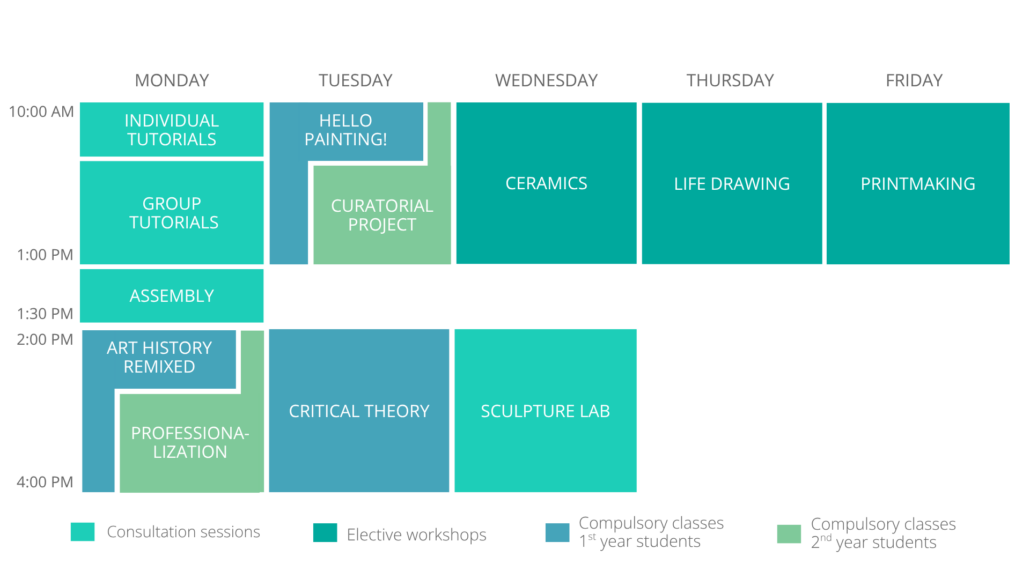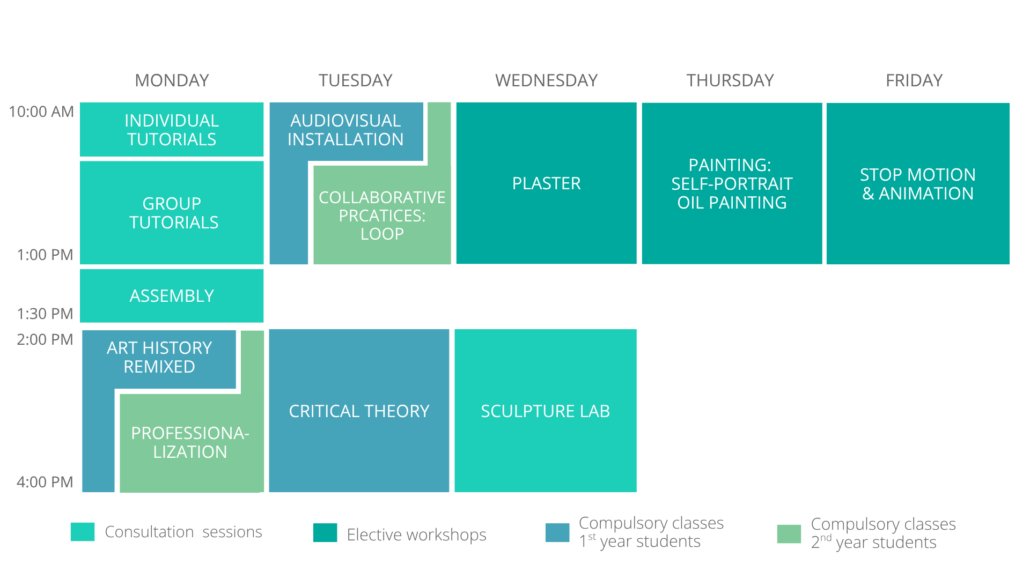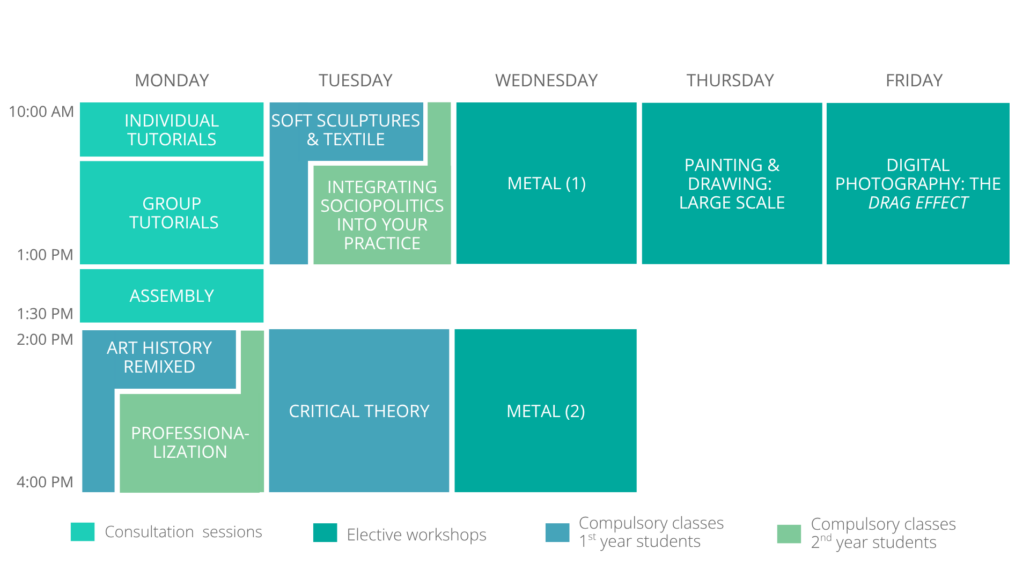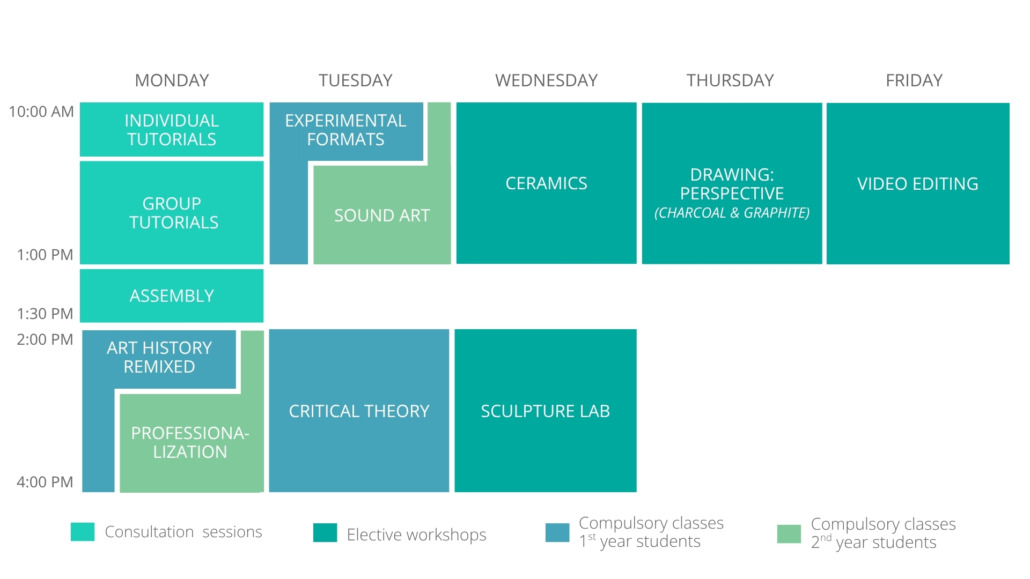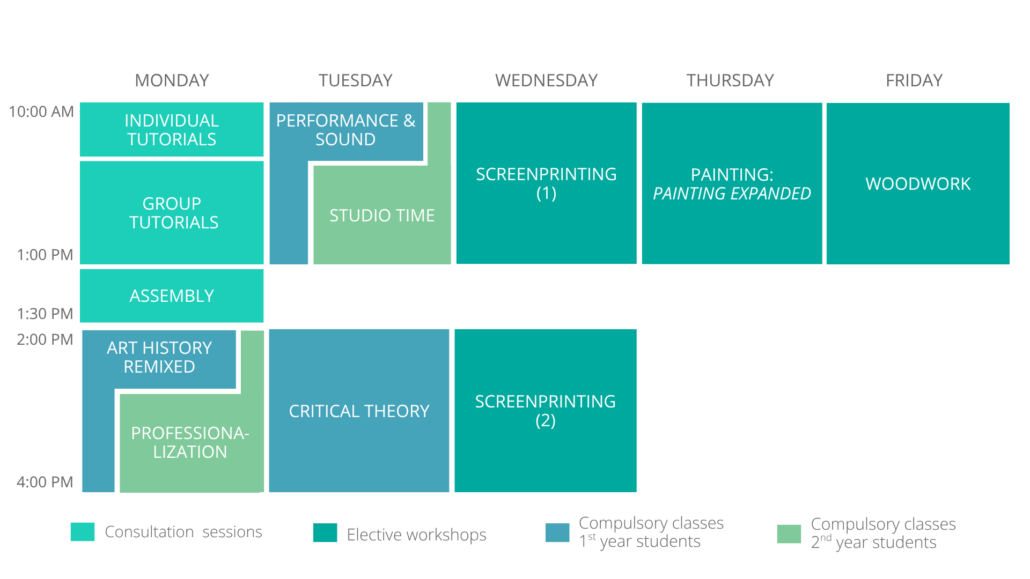A typical week per block
Academic Year 2025-26
New classes and practical workshops are introduced to the Studio Arts Program every 6-weeks.
These are the classes offered for the upcoming year (subject to changes):
8 SEPT – 15 OCT 2025
BLOCK 1:
HELLO PAINTING!
This is an introductory class to the world of painting through the theme of “starting”; starting in Metàfora, starting painting, starting to think through painting. It is designed to equip students with different ways of beginning a painting and ask questions like: how do we start painting? Why? What does it mean to make a painting rather than another art form?
CERAMICS
An introductory course to the world of working with clay, this elective course will allow students to get their hands dirty and create small-scale objects out of different types of clay. After close accompaniment by the teacher, the students will be able to fire their final pieces in an off-campus kiln.
LIFE DRAWING
Students will dive into figurative drawing with live models in this course designed to provide students with a solid foundation in studying the human anatomy. Each session will be divided into two parts. The first part will focus on learning drawing techniques and materials, and the second part will be dedicated to drawing with a live model. We will also learn through a comparative method to find the proportions
PRINTMAKING
Printmaking is the process of reproducing professional impressions of the same image from a matrix by following artisanal printing techniques. Templates are created by carving a flat surface with tools, then transferring ink from this matrix to a sheet of paper with the help of a printing press. The resulting prints are usually part of a limited edition, numbered and signed. In this workshop we will learn two techniques: Linocut (relief print) and Dry Needle (intaglio print).
ART HISTORY REMIXED
Art History Remixed is an experimental approach to how we “tell” stories through art. It seeks to invite voices that have been marginalised, forgotten, othered and deemed inferior to eurocentric standards into the mix. We will panoramically explore examples from around the world, from the 1960’s to the present, and will require all students to reflect on heavily important topics in our world such as intersectionality, transfeminism, decoloniality, gender, queerness, privilege, class, geography, access and race
PROFESSIONALIZATION
PROFESSIONALIZATION BLOCK 1: Networking & Art Market:
Through a combination of historical and current case studies, the class will offer students practical tools to help them think critically about their positioning in the art world. It will help them develop their careers in ways that feel realistic and coherent with their work and long-term vision. Special attention will be given to strategies for positioning, networking and building meaningful professional relationships within the art ecosystem – skills that are crucial for early-career artists as they begin to engage with the art world beyond the studio.
CRITICAL THEORY
CRITICAL THEORY BLOCK 1: Art and Ecology: Contra-Landscapes
This class will introduce contemporary art theory and artistic practices that align with the evolution of environments. Departing from classical to modernist landscapes and “nature,” the seminar will share interpretations of “ecological thinking” toward a “planetary turn” in Geoaesthetics. From queer relationality to erotic (in)animacies, experimental geography to the weather, “Contra-Landscapes” will develop a critical unlearning of “eco-art” for speculative understandings and imaginations of future ecologies instead.
CURATORIAL PROJECT
In this 2nd-year workshop, students will collectively devise, develop and realize a curated show with the objective of bringing the students closer to curatorial methodologies and practices.
20 OCT – 27 NOV 2025
BLOCK 2:
AUDIOVISUAL INSTALLATION
This course explores the possibilities of the moving image installed in space, offering the opportunity to reflect on the intersection of digital art, video art and installation. Students will have the chance to experiment with objects, spaces and screens along with video projections and soundscapes. The aim is to create unusual dialogues between video images and sound as if they were a performance, transforming the space and the viewer’s perception through a personal and artistic visual narrative.
PLASTER
Plaster is a highly malleable, expressive and easy to use material. In this class, students will learn the basics of sculpting with plaster, making a series of small-scale creations. Once the technique is learned, students are encouraged to create their own personal work outside of class hours.
SELF-PORTRAIT OIL PAINTING
In this figurative painting class, students will delve into the timeless art of self-portraiture, learning to capture one’s own likeness using oil paints. Through guided instruction and working from reference photos, the students will develop a deeper understanding of technique, composition and personal expression. This course focuses on techniques for rendering volumes and creating realistic effects. Students will practice classical painting methods, including underpainting, layering and glazing to achieve a rich and nuanced self-portrait.
STOP-MOTION & ANIMATION
This elective will allow students to get familiar with the use of stop motion video editing after an introduction to contemporary artists and filmmakers that make use of this technique. Students will begin by making basic stop motion short films with their smartphones using simple softwares as well as more advanced softwares like Premiere Pro or iMovie.
ART HISTORY REMIXED
ART HISTORY REMIXED BLOCK 2: Bodies / Fragility / Transformation / Corporeality / Translation
This art history course offers a critical and experimental lens on how bodies are represented, perceived, and politicized in contemporary art. Moving beyond Eurocentric narratives, it explores global artistic practices from the 1960s to today, highlighting voices historically marginalized or excluded.
Structured around thematic clusters rather than chronology, the course fosters dialogue on topics such as intersectionality, queerness, decoloniality, gender, class, and race. Students are invited to actively engage through collective reflection, critique, and emotional response—building connections between diverse art histories and their own creative practices.
PROFESSIONALIZATION
PROFESSIONALIZATION BLOCK 2: Make MACBA Yours
The Museu d’Art Contemporani de Barcelona – MACBA is Barcelona’s contemporary art museum and one of the many artistic institutions of reference in our city. Through site visits to the museum, these sessions are meant to demystify the concept of the institution and break down its façade via exercises that help approximate the student to the inner workings and infrastructure of the white cube.
CRITICAL THEORY
CRITICAL THEORY BLOCK 2: Queer theory
Queer theory in art is an interdisciplinary field that examines the intersections of gender, sexuality, race/ethnicity, class identities and representation within artistic practices originating in the 1970s and 1980s. The class is an introduction to queer theory and its influence and development in the art field in which students will learn key concepts (performativity, intersectionality, queer temporality and heteronormativity), talk about queer love as well as explore the artwork of queer artists.
COLLABORATIVE PRACTICES: LOOP
2nd-year students will have the opportunity to participate in the 21st edition of Loop Festival; Barcelona’s premiere festival dedicated to video art and audiovisual creations. Guided by a professional in the art field, the students will collaborate in a group show, creating work together that will be exhibited on campus at the end of the four weeks within the framework of the festival.
19 JAN – 25 FEB 2026
BLOCK 3:
SOFT SCULPTURES & TEXTILE
This workshop is a theoretical and practical exploration of installation art made out of soft materiales with a special focus on textile work. Aimed at encouraging students to experiment, reflect and discuss their artistic practices within a site-specific installation context, participants will be introduced to different working methodologies and a wide range of materials used in installation art, exploring how these choices relate to the concept and symbolism of the artwork.
METAL
This hands-on technical workshop introduces participants to the fundamentals of ARC welding. You’ll gain a solid understanding of the melting and joining processes involved in welding, with guided practice in striking the arc, running a weld bead, and cleaning and polishing the finished joint.
The workshop also includes the creation of a small metal sculpture, allowing you to apply the techniques learned in a creative context.
Special attention is given to welding safety, including the proper use of protective equipment and security protocols.
PAINTING & DRAWING: LARGE SCALE
In this class students will work on large abstract paintings and drawings both individually and collaboratively, focusing on experimental mark-making techniques and using unusual materials to paint with. This way, students will open their minds to alternative forms of representation, moving away from visual reality the way we see it.
DIGITAL PHOTOGRAPHY: THE DRAG EFFECT
Through photographic and lighting strategies, this course will give students a grasp on the basics of digital photography as well as problematizing the hierarchical relationship we establish with objects.
Prior to the session, participants will have collected some discarded or out-of-use objects, which they will bring to the session. During the session, the students will manipulate, transform and install them.
The objective is to rethink and transform in order to create a different vision of the matter closest to us.
ART HISTORY REMIXED
ART HISTORY REMIXED BLOCK 3: Mystery / Unknowability / Territory / Geographies / Communities
This course examines how artists engage with the unknown, the mystical, and the unsettling, while also responding to social and ecological realities. Through site-responsive practices, students explore how art can reflect, question, and influence communities, public spaces, and environmental concerns. The course encourages critical reflection on the artist’s role in fostering awareness, connection, and change.
PROFESSIONALIZATION
PROFESSIONALIZATION BLOCK 3: Survival 101: Residencies, Artist Run Spaces, Open Calls
In this course, 2nd-year students will learn about various artist residency programs, local and international, and learn how to apply to them. They will dig into how residencies work and do site visits to local residency programs. They will also learn about artist-run spaces and how they function, what the requirements are to found a cultural association, legal matters, gaining visibility and other functions essential to surviving as an artist post-Metàfora.
CRITICAL THEORY
CRITICAL THEORY BLOCK 3: The Art of Moving On: Processing and Artistic Practices
INTEGRATING SOCIOPOLITICS INTO YOUR PRACTICE
This course designed for 2nd-year students will approach the heated and sensitive ways in which artists weave social and political narratives in their work. Navigating this process is delicate given that, historically, some artists have appropriated subjects that don’t pertain to their realities. Therefore students will learn to build upon their own places of enunciation to create work for this class.
2 MAR – 16 APR 2026
BLOCK 4:
EXPERIMENTAL FORMATS
This course will provide students with an understanding of the avant-garde Fluxus art movement which, in the 1960’s and 70’s, spanned art, poetry, performance, happenings and other experimental approaches to creativity. If we view TikTok as a platform where numerous performances are constantly created, executed and reinterpreted on a daily basis, we can make a compelling argument that Fluxus remains very much alive, perhaps more so than ever. Six decades after its inception, this course will delve into how Fluxus transcended being merely an art movement to evolve into a way of life, where every gesture or action holds the potential to be perceived as art.
CERAMICS
Offered twice a year at Metàfora, this elective course invites students to explore the expressive possibilities of clay through a variety of techniques and materials.
Much like the first class of the academic year, the workshop provides hands-on experience with different types of clay, guided experimentation, and skill development.
Under the supervision of our associate ceramist, students will have the opportunity to fire their final pieces in a professional off-campus kiln.
DRAWING: PERSPECTIVE (CHARCOAL & GRAPHITE)
The students will delve into the world of charcoal and graphite and learn how to represent depth and spatial perspective into their drawings. Learning about vanishing points, shading techniques for rendering three dimensional objects and other geometrical techniques will be learned.
VIDEO EDITING
In this course, students will experiment with the production of audiovisual projects that have some connection with their own creative process. The idea is to use the most basic means that we have at our disposal: smartphones, video/sound recorders and a simple editing software; resources that will allow for some basic recording and editing exercises using online found footage, distorted sounds and superimposition of still photos.
ART HISTORY REMIXED
ART HISTORY REMIXED BLOCK 4: Lenses / Mixed Identities / Resistance / Subversion / Counterculture
This course challenges traditional Eurocentric art history by centering marginalized voices and alternative narratives from the 1960s to today. Through thematic clusters, students explore global art that resists normative canons and embraces intersectionality, decoloniality, queerness, and countercultural movements. Emphasizing open dialogue and critical reflection, the course invites students to question dominant frameworks and find inspiration for their own practice through diverse and radical artistic expressions.
PROFESSIONALIZATION
PROFESSIONALIZATION BLOCK 4: Statements and presentations: BAM BAM BAM
As second-year students begin to consider graduation and the next steps in their careers, this course focuses on how they speak and write about their artistic practice.
Through a deep dive into personal rhetoric and vocabulary, students will refine their ability to articulate their work clearly and confidently. The course emphasizes the development of strong artist statements and effective presentation skills—essential tools for navigating the professional art world.
CRITICAL THEORY
CRITICAL THEORY BLOCK 4: Decolonial theory
Decolonial theory challenges and dismantles systems of power that perpetuate inequality, marginalization, and cultural erasure. If we understand art as a political tool for transformation, decolonial theory plays a crucial role in building a more inclusive and equitable world. The aim is to understand the basics of decolonial theory and its relevance to art as well as analyzing the impact colonial legacies have on art history, aesthetics, and institutions. The students will explore non-Western artistic traditions and practices as sites of resilience and creativity, and finally develop strategies for integrating decolonial approaches into their own artistic practices.
SOUND ART
This workshop invites artists to explore sound as a central artistic material, rather than a secondary element. Shifting the focus away from the visual, participants will engage in critical listening, spatial exploration, and hands-on experimentation. The course encourages the integration of sound into interdisciplinary practices such as installation, video, performance, and sculpture, while also providing basic tools for recording, editing, and playback. It’s an opportunity to rethink how we create—and how we listen.
20 APR – 29 MAY 2026
BLOCK 5:
PERFORMANCE & SOUND
In this course, the students will engage with the basics of performance and sound art, working in groups and individually to create soundscapes and performances. Several of the objectives are to create performance and sound pieces quickly and with few resources, thinking about the body as a valid element in artistic creations as well as getting to know classical and contemporary artists who work with performance and sound. The students will also explore sound as an artistic, spatial material and understand its expressive potential beyond traditional musical frameworks and develop active and critical listening, training auditory perception as a creative and conceptual tool.
SCREENPRINTING
Silkscreen, or serigraphy, is a versatile printing technique that uses a mesh screen to transfer ink onto a surface—except in areas blocked by a stencil. A photosensitive emulsion is applied to the mesh to fix the image, allowing for precise and repeatable designs.
This process is widely used in both fine art and commercial printing, offering artists a unique method for producing bold, layered imagery on a variety of materials.
PAINTING: PAINTING EXPANDED
What does “expansion” mean for painting, and how can we use the medium that is often thought of as the most conservative, the most traditional, one of the least “contemporary” mediums to depict the frantic squabble that is life in the 21st Century? Through the class activities students will begin to think about what a painting is or can be. What do they like about painting? Why do we paint? What do we tap into by choosing to paint? What topics do we deny ourselves by choosing to work in paint?
WOODWORK
In this course, students will gain a theoretical and practical understanding of wood construction techniques. It includes an introduction to various tools, focusing on their proper use and protection systems.
Other contents include reading a design and assembly plan, understanding of the different parts, choice of wood, measurement and cutting.
ART HISTORY REMIXED
Art History Remixed is an experimental approach to how we “tell” stories through art. It seeks to invite voices that have been marginalised, forgotten, othered and deemed inferior to eurocentric standards into the mix. We will panoramically explore examples from around the world, from the 1960’s to the present, and will require all students to reflect on heavily important topics in our world such as intersectionality, transfeminism, decoloniality, gender, queerness, privilege, class, geography, access and race
PROFESSIONALIZATION
PROFESSIONALIZATION BLOCK 5: Art Ecosystem
This course gives a general overview of the different types of organizations that form an arts ecosystem. The class is centered around a series of in person visits to a wide range of arts spaces including commercial galleries, not for profit / artist-run spaces, museums, private collections, foundations as well as other art related events that may coincide with the course. Its intention is to provide a macro view of various interconnected elements in order to demystify them and to understand how to approach and interact with them.
CRITICAL THEORY
CRITICAL THEORY BLOCK 5: Ecofeminism: Donna Haraway
The course presents an approach to Donna Haraway’s tentacular thinking and its influence on artistic practice. We will explore the metaphor of diffraction to help us think beyond Western dualisms, cyborg and dogs as companion species, symbiosis and holobionts as key concepts to make kin in the Anthropocene, and the Chthulucene as a new name for our era.
STUDIO TIME
Second-year students are offered dedicated time and space to focus on the development of their final pieces in preparation for graduation. This course emphasizes sustained studio practice, allowing students to deepen their engagement with materials, concepts, and personal methodologies as they bring their work to completion.
Please note that the program might be subject to minor schedule modifications.
Holidays
PUBLIC HOLIDAYS
BARCELONA
- 11 September: Catalan National Day
- 24 September: La Mercè
- 12 October: National Day of Spain
- 1 November: All Saints’ Day
- 6 December: Spanish Constitution Day
- 25 December: Christmas Day
- 26 December: Boxing Day
- 1 January: New Year’s Day
- 6 January: Epiphany / Three Kings’ Day
- 18 April: Good Friday
- 21 April: Easter Monday
- 1 May: Labour Day
SCHOOL HOLIDAYS
- 29th November to 19th January: Christmas holidays
- 11th to 21st April: Easter Holidays
SPECIAL DATES
- 15th September: Artist Residency at Nau Estruch starts
- 2nd October: Tertulia /In Conversation with Helen Torres
- 21st October: Artist Residency at Can Serrat starts
- 24th October: LastCrit gallery exhibition opens
- 7th November: Thesis Presentation at MACBA & Final Show at angels Espai 2 gallery
- 28th November: Autumn Banquet
- 5th February: Espai Souvenir gallery exhibition opens
- 19th March: Homesession gallery exhibition opens
- 26th March: 200 Cent gallery exhibition opens
- 30th May: OPEN STUDIOS
- 31st May: Metàfora’s 25th Anniversary Party
Obligatory ECTS credits per year
Typically, students planning to pursue further education in Studio Arts need to earn ECTS credits to validate their courses.
The following tables demonstrate the annual ECTS credit requirements for the Metàfora Studio Arts Program.
* Metàfora is an independent institution and does not hold university accreditation. However, we enable credit convalidation by other institutions by aligning our credits with the ECTS (European Credit Transfer and Accumulation System). 1 ECTS credit is equivalent to 25 hours of combined classroom hours and homework.

